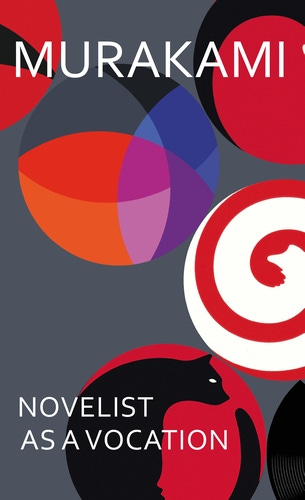Dear Reader,
I haven’t been sleeping well. I’ve been using this extra time at hand to create fake scenarios in my head. I’ve done this all my life and was surprised to know that many (most) people do not do this. Pray, tell, why? Why not direct your solo masterpieces with reel or real characters? Very entertaining. It also distracts you from other worrying things that make you lose your sleep. Yep, I got the memo that you need to empty your head before sleeping. But…
Read
I read Novelist as a Vocation by Haruki Murakami over a night and day (before my sleepless nights if you care about such details). I was surprised to learn that he wrote his first novel in English, then translated it to Japanese and found his writing style. Did you know that?
Novelist as a Vocation is a collection of essays that blend memoir, writing advice and musings from the storyteller himself. Murakami argues why should a writer be an artist? Why limit the act of writing to the time when inspiration strikes? Murakami’s writing routine is disciplined rather than inspirational, and includes exercise and ten pages a day. If he wants to write more than ten, he doesn’t (I ask myself why though?). He likens his own routine to that of other writers like Anthony Trollope. Fun trivia—Trollope wrote from 5:30 am to 8:30 am in the morning (If Trollope finished a novel before 8:30 am, he would immediately take a new page and start work on a new novel), then worked at his day job at the postal service.
Murakami’s own life seems reminiscent of his male characters— impulsive decisions, luck, music, routine. His essays follow the same route of his novels, leaving questions unanswered. Occasionally I was frustrated at the gaps of information. For instance, how did he go from struggling to pay bills (“We had no TV or an alarm clock. Nor was there any real way to heat our rooms”) in his twenties to selling his apartment and moving to another country to write? Did the writing pay well? How did his wife react when he closed down a profitable business for a creative career that could not guarantee success? But instead, Murakami talks about leaving his Tokyo apartment, going to bed early, waking up early, and running as nonchalantly as buying a cup of coffee.
Reading these essays is like taking a walk with Murakami. He recalls seeing a book called “The reasons Haruki Murakami failed to win the Akutagawa Prize or something” at a store. My own thoughts kept switching between whether this stack of books bothered him or not. But I certainly enjoyed how Murakami wrote about his rise in the literary world in Japan, his fame nurtured by the Western markets and The New Yorker, and his social preference to not hang out with other novelists.
As you walk along, you get glimpses of his journey towards becoming a writer. He hailed from a typical middle-class home; a “mundane and non-descript youth without enduring post war chaos, hunger, abuse, discrimination, revolution.”—What could he write about? And then a thought struck him at a baseball game. He explains how his style (that created loyal fandoms no doubt) evolved. The translation between languages (English to Japanese) “was no less than the creation of an unadorned “neutral” style that would allow (me) freer movement.”
Murakami is elusive. Occasionally he will unnerve you—“There’s a right time for things, and if you miss that opportunity, most of the time you’ll never get a second chance,” making you shiver at all the opportunities you have squandered in life. But you forget your own regrets quickly and try to catch up with your walking partner, the novelist. After finishing Novelist as a Vocation, you’ll find that your fellow walking mate has disappeared just as mysteriously, cleverly evading some questions.
"What I want to say is that in a certain sense, while the novelist is creating a novel, he is simultaneously being created by the novel as well." —Haruki Murakami
I discovered Murakami on Amazon (gasp) and many of his books have found their way to me during personally important time periods. Yes, this was perhaps because of the hype the Western publishing world gave him, that he writes about. I’ve been keeping up (kind of) with the debate of the male gaze in his books. But that night when the clock hands moved towards morning, and I kept aside my Kindle to catch a bit of sleep, I missed, wanted, craved a Murakami book.
Murakami speaks for boredom in these essays. He says the person who felt sad about missing school might not make a novelist. As an only child, in my kindergarten years, I cried on weekends and no-school days. I wonder where Murakami’s theory leaves me. Maybe writer enough to send this letter to you.
For those of you who do not like Murakami, pick up All the Lovers in the Night by Meiko Kawakami or The Perfect World of Miwako Sumida by Clarissa Goenawan (my review here), both of which give you similar ‘feels’ as the Tiktok generation would say.
Buy Novelist as a Vocation on Amazon In, Bookshop
You might like
Watch
This new Netflix series—based on a real-life events—on the Mumbai mafia, crime reporting, police, freedom of press and media. I binged Scoop (Hindi) created by Hansal Mehta and Mrunmayee Lagoo Waikul. Crime reporter Jagruthi Patak (Karishma Tanna) who reported on several high profile cases, gets arrested in a murder case where a fellow reporter was murdered on orders from one of India’s notorious gangsters, Chhota Rajan.
The acting in the first few episodes was mediocre (a generalization, I am aware) but I quickly warmed up to the characters and had a sleepless night watching the show, then googling ‘reel vs real’ characters. By the end of the show, I had changed my mind. I loved the performance ( a generalization, I am aware) that made this series feel so real. The race to get the biggest scoop, the gender barriers and office politics obstructing women in powerful positions, the personhood of a journalist—this show touches many relevant points. From what I hear, journalist Jigna Vora’s memoir Behind Bars in Byculla: My Days in Prison, the inspiration for the show is more brutal. It was fascinating to see media, crime, and ambitious women collide; but at the same time heartbreaking to watch knowing this is a fictionalized version of real events.
Book club read
The Satchel Book Club is back. In July we read a YA mystery with indigenous rep and in August we read a cozy Japanese mystery. It is a fuss-free readalong on Instagram and it’s totally okay if you do not finish the book. Join us!
Amazing links
The millennial internet made me laugh. Please more witty pieces like this (Independent)
Rereading my teenage diaries (The Guardian)
Love me a good personal essay—How I learnt to love my mother was splendid. The author has a forthcoming book too.
I wish you good days and restful nights,
Until next time,
Resh x







